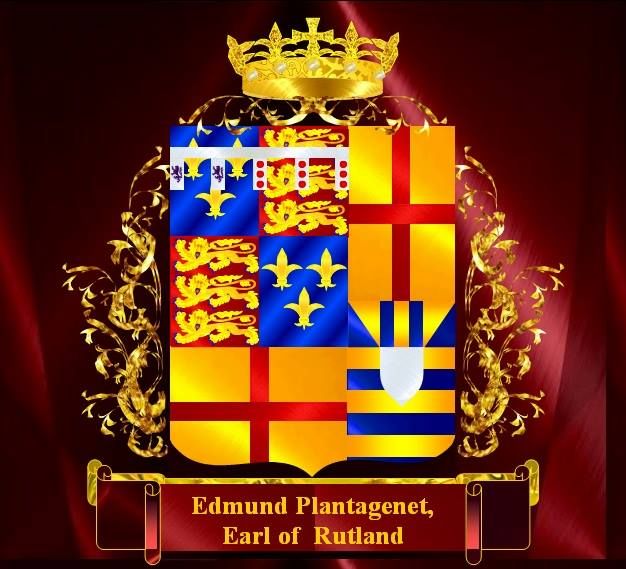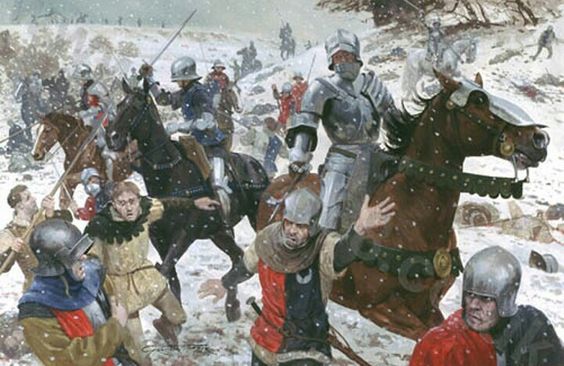Edmund, Earl of Rutland was the fifth and the second son of Richard of York, the 3rd Duke of York. Edmund died at a very young age of 17, fighting by the side of his father at the Battle of Wakefield.

Early Life
Contents
Edmund Plantagenet was born on 17 May 1443 in Rouen, France. At that time his father was serving as the Lord Lieutenant for King Henry VI in France.
Edmund was the fifth and the second surviving son to his father Richard of York and mother Cecily Neville daughter of Ralph Neville, Earl of Westmorland.
Edward received his education from his tutor Richard Croft at the Ludlow Castle, Shropshire Estate.
In 1454, Edmund was appointed the Earl of Rutland and his older brother Edward, the Earl of March by King Henry VI of England.
There are no official records to verify the exact time and date; however, there is a signed letter to Richard of York dated June 14, 1454, which suggests that the year might have been 1454.

Edmund, Lord Chancellor of Ireland
In 1451, Edmund’s father was the Lieutenant of Ireland and he appointed his son Edmund the Lord Chancellor of Ireland. Edmund was just 8 years old at that time, so his duties were first taken over by Deputy Chancellor Edmund Oldhall, Bishop of Meath and then by John Talbot, Earl of Shrewsbury.
John Talbot continued his services as the de facto Chancellor until Edmund’s death in 1460.
Battle of Ludford Bridge
On 12 October 1459, Henry VI and his Lancastrian army at the Battle of Ludford Bridge remained victorious and issued an order to pardon everyone who will join their side within the next 6 days.
The Duke of York who has joined the Earl of Warwick and the Earl of Salisbury retreated towards Ludlow. The Yorkist commanders were severely outnumbered at Ludlow and stood no chance before the 30,000 men of Henry VI.
Edmund then 16 along with his older brother Edward fought alongside their father at the Battle of Ludford Bridge. The Yorkists were outnumbered and defeated and Richard of York was forced to flee the battlefield.
While Rutland fled with his father to Ireland, his older brother Edward accompanied his cousin Richard Neville, Earl of Warwick escaped to Calais.
Rutland’s mother and his younger siblings were left behind at the protection of the royal army.
Rutland and York returned to England on 8 September 1460 after Earl of Warwick declared their victory over the Lancastrians at the Battle of Northampton and Henry VI was taken captive in London.
On 10 October 1460, York declared his right to the throne by the Act of Accord and his two sons Edward and Edmund were put on succession.

Death of Edmund Plantagenet: Battle of Wakefield
On 2nd December 1460, Rutland joined his father’s troop and the Earl of Salisbury to squash out the Lancastrian unrest in England.
On December 16, York’s troops confronted the Lancastrian army at Worksop. On December 21 York arrived at his castle near Wakefield.
On 30 December, York led his men out from the Sandal Castle and charged them towards the Lancastrian forces led by Lord John Clifford and Henry Percy, Earl of Northumberland.
York was ambushed and trapped at the Wakefield Green and ordered Edmund to flee the battlefield and call for reinforcements from his brother Edward who was in the Welsh Marches.
Edward managed to escape but only to be captured again at the Wakefield Bridge. Priest Robert Aspell, Rutland’s tutor made several attempts to release Rutland in exchange for a ransom but it was of no use. Unfortunately, Rutland was stabbed several times and was killed mercilessly, Lord Clifford. Rutland died at the age of 17.
The severed heads of Rutland and York were pierced with spikes and displayed at the Micklegate Bar in York. The rest of the bodies of Rutland and York were buried somewhere near Pontefract Priory.
Edward later restored the bodies and reinstated them in their family vault at the Church of St. Mary and All Saints at Fotheringhay Castle.

The Aftermath
Edward vouched for revenge and Lord Clifford was later slain on 28 March 1461. Edward later ascended the throne as Edward IV of England and all of Clifford’s estates and titles were forfeited on 4 November 1461.
